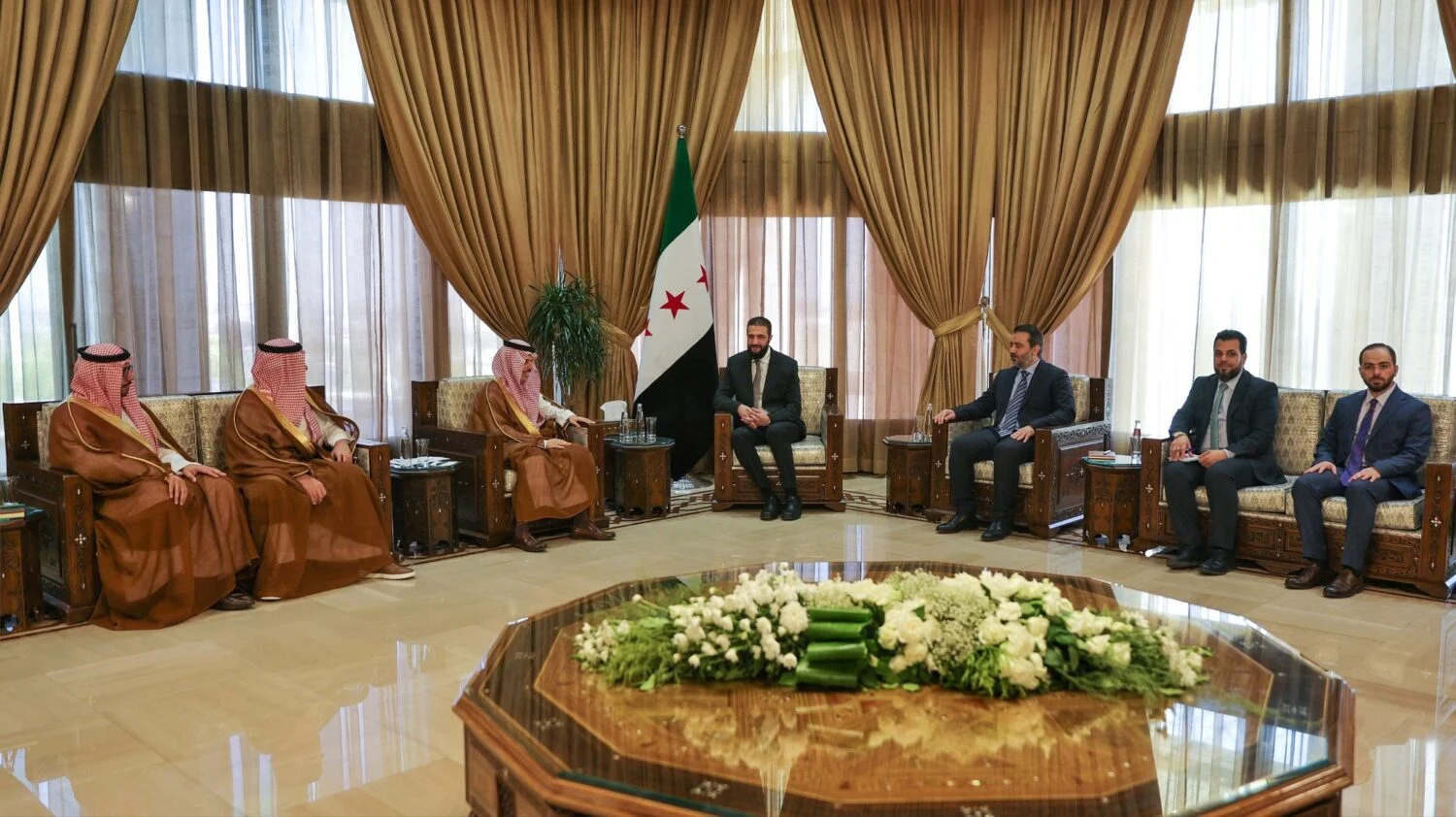Saudi Arabia and Qatar are jointly striving to bolster Syria’s transitional administration, enabling it to revive the shattered economy and initiate the country’s long-awaited reconstruction after 14 years of devastating war.
This effort was formalized in a joint statement on Saturday, in which the two Gulf states announced financial support for Syria’s public sector workers for a period of three months. This follows a previous intervention in April to settle Syria’s $15 million debt arrears to the World Bank.
A Pledge for Stability
According to the joint statement, this financial assistance stems from a desire to “support Syria’s stability,” “alleviate humanitarian suffering,” and “serve the interests of the Syrian people”—all framed as part of the historic and fraternal ties between the three nations.
The statement further emphasized the “firm commitment” of both Riyadh and Doha to promoting development, restoring economic and social stability in Syria, and improving living conditions for its citizens. Both countries also expressed hopes for broader coordination with international partners, particularly regional and global development organizations, under a comprehensive and transparent framework.
Time-Limited Relief
Saudi Foreign Minister Prince Faisal bin Farhan, speaking during his visit to Damascus alongside his Syrian counterpart Asaad al-Shibani, confirmed that the joint support from Saudi Arabia and Qatar would last three months to help the Syrian government meet salary payments amid lingering economic constraints from years of sanctions.
Although the total value of the new financial aid was not disclosed, it mirrors an earlier Qatari grant worth $87 million—allocated over a renewable three-month period—to cover nearly 20% of the Syrian government’s payroll.
According to the United Nations, nine out of ten Syrians currently live below the poverty line and face severe food insecurity. The country has been classified as a “low-income” nation by the World Bank since 2018, after its GDP shrank by more than half between 2010 and 2020.
From Sanctions Relief to Recovery
The Gulf initiative follows their earlier contribution to settling Syria’s World Bank arrears in April. This gesture was paired with behind-the-scenes lobbying from Riyadh, which reportedly played a decisive role in persuading the U.S. and EU to lift economic sanctions on Syria.
In a surprise announcement during a regional tour last month, U.S. President Donald Trump declared the lifting of sanctions—reportedly at the request of Saudi Crown Prince Mohammed bin Salman. The European Union followed suit shortly thereafter.
The financial support comes amid mounting Saudi-Qatari economic engagement with Syria. A high-level Saudi economic delegation recently visited Damascus to discuss energy, agriculture, and infrastructure investments. Syria’s Foreign Minister announced a major energy deal to expand electricity access, and Saudi business leaders are expected to visit the capital soon to explore further opportunities.
Strategic Goals Behind the Aid
While framed as humanitarian and developmental, the Gulf aid package raises questions about the underlying strategic motives of Riyadh and Doha—especially at this critical transitional juncture in Syria’s post-war trajectory.
Political analyst Karim Sader, a Gulf affairs expert and former research adviser at France’s Ministry of Defence, told France 24 that Saudi Arabia views Syria’s transition as an opportunity to consolidate its geopolitical position in the region. With the fall of the Assad regime and Iran’s waning influence, Syria—along with Lebanon and potentially Gaza—forms a strategic gateway to the Mediterranean. By pushing for sanctions relief and re-engaging Syria with international financial institutions, Saudi Arabia seeks to enhance the new government’s legitimacy while carving out a key role for itself.
“Saudi Arabia supports the central state in Syria to secure its influence in this vital corridor,” Sader said. “By helping to repay part of Syria’s debts, Riyadh is effectively offering a gift—but one with strings attached. Syria’s reconstruction offers enormous opportunities, and Saudi Arabia aims to ensure a strong presence in the new Syria.”
Qatar’s Calculated Flexibility
Sader also explained that Qatar’s approach is shaped by diplomatic caution and ambition. As an ally of Turkey, Qatar is keen to avoid antagonising either Ankara or Riyadh. Its strategy aims to maintain open alliances to shield itself from geopolitical fallout—especially amid past accusations, notably during Trump’s first term, of funding terrorism.
Qatar also has substantial economic stakes in Syria, chief among them a long-stalled natural gas pipeline project linking Qatar through Saudi Arabia and Syria to Turkey. Launched in 2000, the “Islamic Gas Pipeline” was shelved due to the Syrian war. Stability in Syria could revive this key strategic venture.
A Bid for Influence in Syria’s Future
In sum, the financial aid extended by Saudi Arabia and Qatar to Syria’s public sector appears to serve dual purposes: immediate humanitarian relief and long-term political and economic leverage. Both countries hold considerable interests in Syria’s post-war recovery—interests that hinge on the stability and viability of the new Syrian administration.
Their coordinated support may indeed help stabilise Syria’s transitional government. But it also reflects a calculated investment—designed not only to influence Syria’s trajectory but to secure a seat at the table in shaping its future.
This article was translated and edited by The Syrian Observer. The Syrian Observer has not verified the content of this story. Responsibility for the information and views set out in this article lies entirely with the author.


